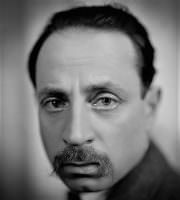About Rainer Maria Rilke
Rainer Maria Rilke (1875–1926) was an Austrian poet, playwright and translator. He was born in Prague, Czechoslovakia, to Josef Rilke, a minor railroad official, and Sophie Entz, a descendant of an aristocratic family. Rilke’s parents separated when he was nine, and he was sent to a military academy by his father. Because of ill health, Rilke left the academy and traveled to Leinz, Austria, to study business. He was apprenticed to his uncle’s law firm as a clerk. Rilke decided against a career in business and attended universities in Prague, Berlin, and Munich, where he studied art history, philosophy, and literature. He developed a talent for languages and became fluent in Russian, French, English, Danish, and Czech. Rilke developed a close relationship with several Russian intellectuals and accompanied them on a trip to Russia in 1899, where he met Leo Tolstoy and studied Russian spiritual mysticism.Rilke is considered one of the greatest lyrical poets of the German-speaking world. He began his career as a poet in 1894 when he published a small, conventional volume of poems, [Leben und Leider]. While working as a correspondence secretary for Auguste Rodin in Paris, Rilke composed The Book of the Hours: The Book of Monastic Life. Saint Francis of Assisi is a major figure in the work. Rilke transforms this conventional image of Christian humility and piety into a kind of pagan nature spirit who permeates all things. Furthermore, Rilke praises traditional Christian values, such as poverty and spiritual purity, and often presents God as a humble, homeless man: “For blessed are those who never went away / And stood still in the rain without a roof.” Among Rilke’s prose works, The Tale of the Love and Death of Coronet Christoph Rilke (1906), a long prose poem, which became a great popular success. Rilke was a master of several genres. His famous novel The Notebooks of Malte Laurids Brigge (1910) takes the form of the diary of a Danish poet who arrives in Paris and describes his reactions to the cultural and intellectual life in the city. The novel uses flashbacks to describe the events of Laurids’s childhood and the various European cities that he had visited.
Rilke’s last seminal collections of poetry, Duino Elegies and Sonnets to Orpheus, were both published in 1923. Both works no longer dealt with ordinary images; instead, they concentrated on the larger themes of life and death, spirituality, philosophy, and materiality. Rilke presented material and spiritual worlds as entities and the individual as an observer entrapped between the both realms, only momentarily able to capture them. Indeed, the theme of alienation is one of the most dominant ones in the collection: “We are not at one / Are not in agreement like birds of passage / Overtaken and delayed, we force ourselves suddenly on the winds / and fall onto an indifferent pond.”
Rainer Maria Rilke established himself as one of the most important figures of German literature. Although he is mainly remembered as a poet, he made a remendous impact in virtually every genre. Rilke’s influence on his generation of poets is simply enormous: he composed a significant corpus of poetic works in Russian and French, and he translated innumerable literary works from English, French, Russian, and Danish into German. Today, Rainer Maria Rilke is considered as the most important 20th-century poet of the German-speaking world: “Rilke was a large man, expansive in his concern for the fate of human beings in a difficult world,” as Patricia Brodsky notes. Rilke’s death was as strange as his life; he died from an infection that was contracted from a prick of a rose’s thorn. He died of leukemia on December 29, 1926 at the Val-Mont clinic near Montreux in Switzerland, he was buried in Raron in the canton of Valais on January 2, 1927.
Browse all poems and texts published on Rainer Maria Rilke









